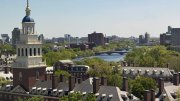Harvard’s former President Lawrence S. Bacow earned more than $3 million in total compensation in 2023-2024, and former President Claudine Gay earned about $1.3 million that year, according to tax filings the University released on Thursday. The filings, covering the fiscal year that ended on June 30, 2024, include information on the earnings of University leaders and the accompanying Harvard Management Company (HMC) disclosure of senior employees’ compensation for calendar year 2023.
Compensation for the University’s Leaders
The most highly compensated officers are the expected ones among Harvard leaders; additional compensation is not shown where it represents only the value of employee benefits and retirement contributions:
Lawrence S. Bacow, president until June 30, 2023, $2,904,050 plus other compensation of $176,683 (principally the value of the University-provided official residence, Elmwood, and employer-provided portions of benefits and retirement contributions). Bacow’s compensation includes a bonus and incentive payment of $1.4 million and a payout from his deferred compensation account upon his retirement.
Claudine Gay, former president beginning July 1, 2023 and previously dean of the Faculty of Arts and Sciences, $1,079,008, plus other compensation of $283,947 (again, Harvard-provided housing).
Alan M. Garber, provost and then interim president as of January 2, 2024, $922,068, plus other compensation of $242,968 (again principally reflecting the value of a University-provided residence). Notably, president Garber announced that he will take a pay cut of 25 percent starting July 1, 2025 in light of the loss of federal funding. That drop in compensation will be reflected in the tax filing two years hence.
Diane Lopez, vice president and general counsel (now retired), $972,728.
George Q. Daley, dean, Harvard Medical School, $970,945.
Srikant M. Datar, dean, Harvard Business School, $947,857 plus other compensation of $192,245 (University-provided housing, principally).
Brian Lee, vice president, alumni affairs and development, $883,103.
John Manning, interim provost as of March 14, 2024 (now provost), $810,537.
Among other notable figures whose compensation is reported were Harvard Business School faculty members who participated in the voluntary retirement plan in return for a lump-sum payment (Paul Healy, $1,928,441; Herman Leonard, $1,786,044) and other officers (Meredith Weenick, executive vice president, $777,736; Paul Andrew, vice president for public affairs and communications, $570,222; and Marc L. Goodheart, vice president and secretary of the University, $573,516).
For the fourth year in a row, McKay professor of the practice of computer science David J. Malan appears on the highly compensated list, with reported compensation of $1,369,936. He is the creator and leader of the phenomenally popular Computer Science 50 course, Introduction to Computer Science. It is among the largest courses at Harvard, has been cloned at Yale, and commands huge online enrollments.
The Endowment Managers
HMC—the University subsidiary which invests endowment and other financial assets—reported calendar year 2023 compensation. That period includes the second half of fiscal year 2023 (during which HMC reported a net investment return of 2.9 percent) and the first half of fiscal year 2024 (during which HMC reported a net investment return of 9.6 percent). The compensation reported on the HMC tax filing, shown below, in some cases reflects a total higher than compensation awarded for calendar 2023 because it includes payment of previously deferred compensation earned in prior years. (The latter effect is indicated below where reported by HMC today; the same also applies to some members of the investment team who received payments of previously-deferred compensation in calendar year 2023, but for whom the differences over time were not disclosed in detail.)
N. P. Narvekar, chief executive officer, $6,065,114, including deferred compensation. Salary and incentive-based compensation awarded for calendar year 2023 was $5.97 million.
Richard Slocum, chief investment officer, $4,855,885, including deferred compensation. Salary and incentive-based compensation awarded for calendar year 2023 was $4.78 million.
Sanjeev Daga, chief operating officer and treasurer, reported compensation $4,849,849. Salary and incentive-based compensation awarded for calendar year 2023 was $4.78 million.
And among the investment team members:
Adam Goldstein, generalist team, $3,585,935;
Charlie Saravia, generalist team, $3,405,829;
Elise McDonald, generalist team, $3,159,716.
Last year’s report on compensation, based on the Form 990 filings for fiscal year 2023, is available here.









